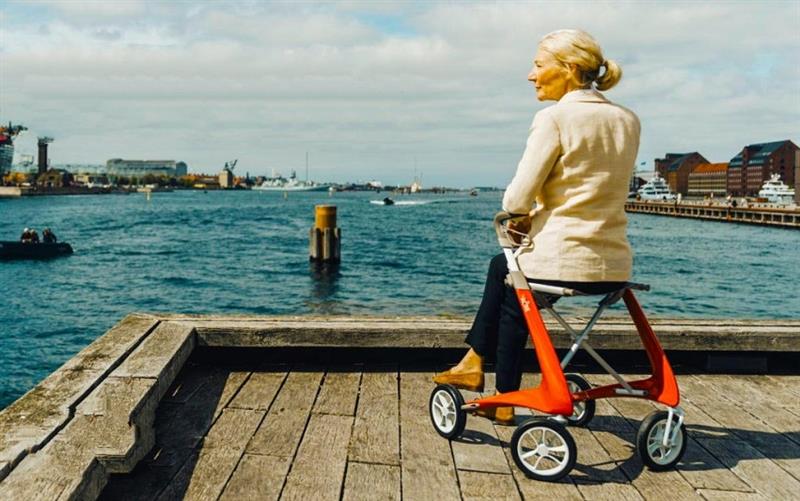
The term "wheeled walker" is sometimes used to describe a rollator, which differs from a 2-wheeled walker. It is made up of a frame with three or four substantial wheels, handlebars, and an integrated seat. Patients who simply require a walker for balance and not for weight-bearing typically utilise it.
A rollator might be a better option for you if your health condition necessitates frequent rest stops. A rollator with a seat and a crossbar for back support allows the user to stop and take a break as needed, unlike a walker that has no seat.
When it comes to mobility aids, rollators have gained immense popularity due to their versatility and functionality. Designed to provide support and assistance to individuals with mobility challenges, rollators offer a convenient and reliable means of getting around. However, with the wide range of options available in the market, it's important to understand the different kinds of rollators and their unique features to choose the one that best suits your needs. In this article, we will explore some of the most common types of rollators and their benefits.
1. Basic Rollators:
Basic rollators are the most straightforward type of rollators available. They typically feature a sturdy frame with four wheels, handlebars for grip, and a built-in seat for resting. Basic rollators are lightweight and easy to maneuver, making them suitable for indoor and outdoor use. They provide stability and support, allowing users to walk comfortably while having the option to sit when needed.
2. Three-Wheeled Rollators:
Three-wheeled rollators, as the name suggests, feature three wheels instead of four. These rollators are known for their agility and maneuverability. With a narrower frame, they are particularly useful for navigating tight spaces and crowded areas. Three-wheeled rollators are ideal for individuals who require a compact and versatile mobility aid.
3. Four-Wheeled Rollators with Hand Brakes:
Four-wheeled rollators with hand brakes offer enhanced control and stability. They are equipped with hand-operated brakes that allow users to slow down or stop when needed. These rollators are suitable for individuals who may require additional support and balance assistance. The hand brakes provide a sense of security, especially when navigating uneven terrains or descending slopes.
4. Rollators with Built-in Basket or Storage Bag:
Rollators with built-in baskets or storage bags provide a convenient solution for carrying personal items or groceries. These rollators feature a spacious basket or bag attached to the frame, allowing users to transport their belongings easily. Whether you're heading to the local market or simply need a place to store your essentials while on the move, rollators with built-in storage options offer both functionality and convenience.
5. Rollators with Adjustable Height:
For individuals of different heights or those who require customized support, rollators with adjustable height are an excellent choice. These rollators feature adjustable handlebars that can be raised or lowered to accommodate the user's preferred height. This feature ensures proper ergonomic positioning and comfort, promoting a more enjoyable and safe walking experience.
6. Heavy-Duty Rollators:
Heavy-duty rollators are designed to accommodate individuals with a higher weight capacity. These rollators are built with a robust frame, reinforced seat, and durable wheels to provide stability and support for individuals with a larger body frame. Heavy-duty rollators offer the same convenience and functionality as standard rollators, ensuring individuals of all sizes can benefit from improved mobility.
7. Specialized Rollators:
In addition to the standard rollators, there are specialized rollators available to cater to specific needs. This includes rollators with extra-wide seats for individuals requiring more seating space, rollators with forearm supports for individuals with limited hand strength, and rollators with knee pads for those who have difficulty bearing weight on their lower limbs. Specialized rollators aim to provide customized support and address specific mobility challenges.
Rollators come in a variety of designs to suit various requirements.1 Within the same rollator, you can find some of these features combined. Think about the advantages and browse around until you find the one with all you require.
Many functions that are available for rollators are not unique, just like ones for walkers. A rollator with height-adjustable handlebars, a seat that can be raised or lowered, and hand brakes is an option.
8. Adjustable Rollator for Height:
The seat and handlebars of a rollator may be height-adjustable. Some of them are versatile enough to be marketed as both "youth" and "adult" models.
9. Rollator Indoor/Outdoor:
Do you often go out? There are rollators available with non-marring tyres that are typically at least 6" in diameter and soft-grip casters. These serve a dual role by facilitating movement over park dirt paths while protecting your home flooring from damage. For rough terrain and outdoor use, larger wheels (8" and 10") are preferable.
10. Rollator Weight Norm:
A rollator typically weighs roughly 15 pounds.
There are certain models that claim to be "lightweight." These small models might weigh as little as eleven pounds. Some people see a difference after losing a few pounds.
The other thing to think about when it comes to weight is "weight-capacity." The safety of standard rollators has been tested for users weighing up to 250–350 pounds.
Models that are categorised as "bariatric" exist, but your search should go farther. Some bariatric models have undergone safety testing for users up to 400 pounds, while others have undergone safety testing for users up to 500 pounds.